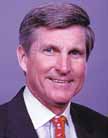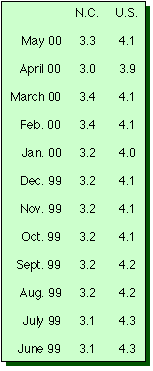Everett, Hunt to Lead
Business Summit for Education
|
 Hundreds of the state's top
business and education leaders will join Gov. Jim
Hunt and Mac Everett (left), president
of First Union Mid-Atlantic, co-chairs for the
event, on June 27 for the N.C. Business Summit
for Education 2000. The event is designed to tap
ideas and to develop workable strategies to
improve family, community, and business support
for North Carolina’s public schools. The
Summit, a follow up to a similar statewide
meeting held in 1997, is a key component of
Hunt's goal to make North Carolina's schools
First in America by 2010. Hundreds of the state's top
business and education leaders will join Gov. Jim
Hunt and Mac Everett (left), president
of First Union Mid-Atlantic, co-chairs for the
event, on June 27 for the N.C. Business Summit
for Education 2000. The event is designed to tap
ideas and to develop workable strategies to
improve family, community, and business support
for North Carolina’s public schools. The
Summit, a follow up to a similar statewide
meeting held in 1997, is a key component of
Hunt's goal to make North Carolina's schools
First in America by 2010.
"In recent years, North Carolina has made
tremendous progress thanks to the commitment and
leadership of our business community," Hunt
said. "If we can come this far, there's no
reason why we can't make our schools First in
America by 2010. That's what this summit is about
-- building an even stronger business/education
partnership, and asking the tough questions about
what more needs to be done. Many of our
state’s top business and education minds are
coming together to develop specific ways to
reinforce family, community and business support
in our schools, which is one of the most
important things we can do to give our young
people the kind of education they deserve."
The summit, hosted by IBM and Glaxo Wellcome,
will take place from 8:30 a.m. - 3:30 p.m. on
Tuesday, June 27, at the IBM Employee Activity
& Fitness Center in Research Triangle Park.
Both companies are at the forefront of improving
the quality of public education in the state.
"The quality of our state’s future
workforce will be determined, to a large degree,
by the quality of education we provide for our
children," said Everett, who also is this
year's NCCBI chairman. "First Union firmly
recognizes that fact, and is committed to doing
its part to further our state’s education
goals. I am personally excited and proud to join
forces with Governor Hunt, the visionary
leadership at IBM and Glaxo Wellcome, and other
North Carolina business leaders and educators to
achieve real progress at this year’s
event."
North Carolina was the first state to launch a
Business Summit for Education three years ago
following the 1996 National Education Summit,
which brought together governors and business
leaders from more than 40 states to jumpstart a
national effort to raise academic standards.
In recent years, North Carolina has made more
progress in its public schools than any other
state in America by focusing on early childhood
education, excellent teachers, high academic
standards, safe schools and business and
community support. Last year, Hunt challenged
North Carolinians to take that progress even
further by making their public schools the best
in the nation. North Carolina is the only state
in America that has set a goal of making its
schools the best, and measuring its progress
against that of other states.
Strategies and solutions coming out of the
day-long Summit will be compiled and presented to
Gov. Hunt, who will then charge his Education
Cabinet – made up of the state’s top
education leaders and which oversees the First in
America effort – with implementing them.
NCCBI President Phil Kirk, chariman of the State
Board of Education and a member of the Education
Cabinet, will also speak.
For more information about the NC Business Summit
for Education 2000, or the state's efforts to
improve schools, contact April White in the
Governor’s office at (919) 733-5612, or
Randy Williamson at Capital Strategies: (919)
932-8631.
 Unemployment Rate Inches Up Unemployment Rate Inches Up
North Carolina’s
seasonally adjusted unemployment rate increased
in May by three tenths of one percent, said ESC
Chairman Parker Chesson. The jobless rate for the
period rose to 3.3 percent, up from 3.0 percent
in April (chart, right). In May 1999, North
Carolina’s jobless rate was estimated at 3.1
percent. North Carolina’s unemployment rate
remains below the U.S. rate, which also rose in
May to 4.1 percent. North Carolina’s labor
force was estimated at 3,930,900 in May. "We
have nearly 59,000 more people at work now than a
year ago," Chesson said. "Overall,
North Carolina's employment picture remains quite
healthy."
Durham Elections Board
Rejects New Election
 The Durham County Board of
Elections voted 2-1 Wednesday to fire Elections
Director Carol Booth in the wake of the botched
primary elections in the 23rd House District .
The board also voted 2-1 to dismiss 13 complaints
calling for a new Democratic primary in the
district. In the primary, veteran state Rep.
George Miller (D-Durham) lost to challenger Paul
Miller by 1,352 votes. But reports quickly came
in that 4,600 voters had been moved to other
precincts without first notifying them and that
another 732 voters had been improperly moved into
or out of the district. George Miller (left)
was one of the 13 petitioners asking for a new
election. The whole matter is expected to end up
in the lap of the State Board of Elections. The Durham County Board of
Elections voted 2-1 Wednesday to fire Elections
Director Carol Booth in the wake of the botched
primary elections in the 23rd House District .
The board also voted 2-1 to dismiss 13 complaints
calling for a new Democratic primary in the
district. In the primary, veteran state Rep.
George Miller (D-Durham) lost to challenger Paul
Miller by 1,352 votes. But reports quickly came
in that 4,600 voters had been moved to other
precincts without first notifying them and that
another 732 voters had been improperly moved into
or out of the district. George Miller (left)
was one of the 13 petitioners asking for a new
election. The whole matter is expected to end up
in the lap of the State Board of Elections.
NCSU Spending Worries Bond
Backers
N.C. State
University's Public Safety Department possibly
misspent $2.2 million in unused salary money for
campus cops on expensive electronic gadgets,
according to a story in the Raleigh News &
Observer. Concerns immediately arose that the
flap would weaken voter support for the $3.1
billion in higher education facilities bonds on
the fall ballot. The General Assembly last year
gave UNC System campuses greater budgetary
control over how state-appropriated money is
spent and accounted for.
DOT Creates Advisory
Panels to Guide Spending
State
Transportation Secretary David McCoy has
appointed one statewide advisory panel and three
regional councils help decide how North Carolina
will spend $22 million under the federal
Transportation Enhancement Program. The money
comes from the Transportation Equity Act for the
21st century for non-traditional projects such as
beautification projects, bike paths and
refurbishing historic transportation facilities.
The regional councils will decide how to spend
$17.6 million of the grant while the state
council will allocate $4.4 million. The Eastern
Council will get $5.1 million for projects in
Bertie, Camden, Chowan, Currituck, Dare, Gates,
Hertford, Hyde, Martin, Northampton, Pasquotank,
Perquimans, Tyrell, Washington, Beaufort,
Carteret, Craven, Greene, Jones, Lenoir, Pamlico,
Pitt, Brunswick, Duplin, New Hanover, Onslow,
Pender and Sampson counties. The Central Council
will get $7.9 million for projects in Bladen,
Columbus, Cumberland, Harnett, Robeson, Alamance,
Caswell, Guilford, Orange, Rockingham, Chatham,
Hoke, Lee, Montgomery, Moore, Randolph, Richmond,
Scotland, Anson, Cabarrus, Mecklenburg, Stanly,
Union, Durham, Franklin, Granville, Person,
Vance, Wake and Warren counties. The Western
Council will get $4.6 million for projects in
Alleghany, Ashe, Avery, Caldwell, Surry, Watauga,
Wilkes, Yadkin, Alexander, Catawba, Cleveland,
Gaston, Iredell, Lincoln, Buncombe, Burke,
Madison, McDowell, Mitchell, Rutherford, Yancey,
Cherokee, Clay, Graham, Haywood, Henderson,
Jackson, Macon, Polk, Swain and Transylvania
counties.
Education Board Plans
Hearings on Policy Changes
The State
Board of Education is proposing to make several
policy changes as outlined below. A public
hearing has been scheduled for Friday, June 30,
to receive comments on the following rule changes
to the North Carolina Administrative Code:
* 16 NCAC 6G .0310 Repeal Annual Performance
Standards Grades 9-12
* 16 NCAC 6G .0305 Rewrite to combine all
performance standards in a single rule. The
rewrite also moves high schools to a prediction
formula.
A second hearing has been scheduled for Monday,
July 31, beginning at 9:30 a.m. to receive
comments on the following rule changes to the
North Carolina Administrative Code:
* 16 NCAC 6D .0503 State Graduation Requirements.
This rule is being republished to include a
change to the college/university prep course of
study. The Board asked that the requirements for
this course of study be consistent with the
University System's admission requirements. This
means that entering 9th graders for fall 2000
will be required to pass two credits in the same
second language. In addition, a fourth course of
study, Occupational, has been added and is
presented for public comment. Both hearings are
scheduled to begin at 9:30 a.m. in Room 224,
Education Building, 301 N. Wilmington Street,
Raleigh. Comments may also be e-mailed to the
attention of Harry Wilson at hwilson@dpi.state.nc.us
, faxed to 919/715-0764, or mailed to: Department
of Public Instruction, 301 N. Wilmington Street,
Raleigh, NC 27601-2825.
Return to main page
|
|
|